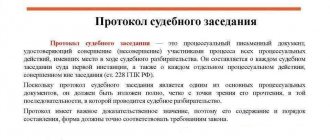Procedure for adjourning a court hearing
The procedure for postponing the process is prescribed in Art. 169 Code of Civil Procedure of the Russian Federation. At its core, a postponement (or transfer) is an action of a procedural nature; accordingly, it must be properly formalized by issuing a court ruling. The determination indicates the reason for the adjournment, when the next meeting will be held, as well as a list of obligations that the parties must fulfill before the next date.
The reasons for deposition are:
- Failure of one or more persons participating in the case to appear.
- Filing a counterclaim by the defendant.
- Request for evidence by the court.
- Involvement of new persons in the proceedings.
- The occurrence of technical difficulties, for example, when conducting a video conference call, when taking minutes of a court hearing, etc.
- Other procedural actions to be carried out that cannot be carried out at the current court hearing.
- Request by the parties to conduct a mediation process.
If the case is postponed, the judge sets a new date and notifies all persons involved in the case. The appointment is made taking into account the necessary time period to prepare for the process. After the process is resumed, it starts from the same place where it was paused.
How long is it permissible to postpone the trial?
Good afternoon. The date of the court hearing was postponed by 1 month due to the judge’s vacation and a new date was set for October 27. Later the secretary called me and said that the case was being postponed again, but for 21 days. After 6 days they called and rescheduled it again for 28 days. How long can this last?
Lawyer Antonov A.P.
Good afternoon According to Art. 154 of the Civil Procedure Code, civil cases are considered and resolved by the court before the expiration of two months from the date of receipt of the application to the court, unless other terms for consideration and resolution of cases are established by this Code, and by the magistrate before the expiration of a month from the date of acceptance of the application for proceedings. Cases on reinstatement at work, collection of alimony, demolition of unauthorized buildings or their bringing into compliance with the maximum parameters of permitted construction, reconstruction of capital construction projects, established land use and development rules, territory planning documentation, or mandatory requirements for the parameters of capital construction projects established federal laws on challenging decisions of state bodies or local governments on the demolition of unauthorized buildings or on bringing them into compliance with the maximum parameters of permitted construction, reconstruction of capital construction projects, established land use and development rules, territory planning documentation, or mandatory requirements for the parameters of objects capital construction established by federal laws, challenging decisions of state authorities or local governments on the termination of proprietary rights to land plots (rights of lifelong inheritable possession, rights of permanent (indefinite) use) due to failure to fulfill obligations to demolish an unauthorized building or bring it into compliance with the specified parameters and requirements are considered and resolved before the end of the month. Federal laws may establish shortened deadlines for consideration and resolution of certain categories of civil cases. According to Art. 169 of the Civil Procedure Code, adjournment of the trial of a case is allowed in cases provided for by this Code, as well as in the event that the court finds it impossible to consider the case at this court hearing due to the failure of any of the participants in the process, the filing of a counterclaim, the need to present or require additional evidence , involving other persons in the case, performing other procedural actions, the occurrence of technical problems when using technical means of conducting a court hearing, including video conferencing systems. The court may postpone the hearing of the case for a period not exceeding sixty days at the request of both parties if they decide to conduct a mediation procedure. The court is obliged to postpone for thirty days the hearing of a case related to a dispute over a child in the event of receipt of written notification from the central authority appointed in the Russian Federation in order to ensure the fulfillment of obligations under an international treaty of the Russian Federation that it has received an application for the illegal transfer of this child to the Russian Federation. Federation or his retention in the Russian Federation, with a copy of the application attached to the notification, if the child has not reached the age at which the specified international treaty is not subject to application in relation to this child. If the trial of the case is postponed, a date for a new court hearing is set, taking into account the time required to call the participants in the process or request evidence, which is announced to the persons who have appeared against receipt. Persons who failed to appear and persons newly invited to participate in the process are notified of the time and place of the new court hearing. The hearing of the case after its adjournment is resumed from the moment from which it was adjourned. Re-examination of evidence examined before the adjournment of the case is not carried out.
Thus, even if there are adjournments of the court hearing, the period for consideration of the case should not exceed 2 months.
Sincerely, lawyer Anatoly Antonov, managing partner of the law firm Antonov and Partners.
Still have questions for your lawyer? Ask them right now here, or call us by phone in Moscow +7 (499) 288-34-32 or in Samara +7 (846) 212-99-71 (24 hours a day), or come to our office for a consultation (by pre-registration)!
How to file a petition to postpone a court hearing?
The form of this document is not approved by law. This means that it can be drawn up in any form, taking into account the requirements of procedural legislation and document flow.
Have a question? We'll answer by phone! The call is free!
Moscow: +7 (499) 938-49-02
St. Petersburg: +7 (812) 467-39-58
Free call within Russia, ext. 453
In practice, it contains the following data:
- Information about the court in which the case is being heard.
- Information about the applicant of the petition, his procedural role (plaintiff, defendant, third party).
- Name of the document (petition or application).
- Information about the case number, as well as information about the persons involved in it.
- Please reschedule for another date.
- Reasons for transfer.
- Applicant's signature.
- Date of document creation.
- Power of attorney data if the application is submitted on behalf of a representative.
You can submit a document to the court either before the start of the court hearing or during the process. In the first case, the document is transferred through the court office, and in the second, its availability is declared during the process and the application is attached to the case. It is possible to submit a petition orally at a court hearing.
So, if there are reasons that are recognized by law as valid, then on the basis of such reasons the court hearing may be postponed.
Adjournment of the case
Adjournment of the case
– transferring the consideration of the case on the merits to another court hearing.
Grounds for adjournment of proceedings
– various circumstances preventing the consideration of the case on the merits.
Postponement of the trial of the case is allowed if the court finds the consideration of the case impossible for the following reasons:
- failure of any of the participants in the process to appear;
- filing a counterclaim;
- the need to provide or require additional evidence;
- involving other persons in the case;
- performing other procedural actions.
This list is not exhaustive.
The court issues a ruling on postponing the court hearing ,
which is not subject to appeal. In the ruling on postponing the trial of the case, the court must set a date for a new court hearing, measures that must be taken to ensure the possibility of considering the case at the next court hearing. If the trial of a case is adjourned, the date is set taking into account the time required to call the participants in the process or request evidence, which is announced to the persons who appear against a signature. Persons who failed to appear and persons newly invited to participate in the process are notified of the time and place of the new court hearing. If the trial of a case is postponed, the time limits for consideration and resolution of the case are not suspended.
If the trial of a case is postponed, the court has the right to question the witnesses who have appeared, if the parties are present at the court hearing. The second summoning of these witnesses to a new court hearing is allowed only if necessary.
A new trial of the case after its adjournment, in accordance with the principle of continuity and immediacy, begins from the beginning, that is, from the preparatory part of the court session.
The Code of Civil Procedure of the Russian Federation contains a provision that is a kind of exception to these principles: the continuation of the trial is allowed without repeating the previously given explanations of all participants in the process under the following conditions:
- the parties do not insist on repeating these explanations;
- the parties are familiar with the case materials, including the explanations of the participants in the process given earlier;
- the composition of the court has not changed.
In this case, the court provides the participants in the process with the opportunity to confirm the previously given explanations without repeating them, supplement them, and ask additional questions. Consideration of the case after its adjournment in this manner is the right, not the obligation of the court.
Postponement of the trial should be distinguished from a break in the court hearing and suspension of the proceedings.
Adjournment of the case
– postponement of the trial to another period, during which other cases may be considered. Therefore, as a rule, after an adjournment, the trial of the case begins from the beginning. When a break is announced, the consideration of the case continues from the moment it was interrupted.
Suspension of the proceedings
differs in grounds, legal consequences, terms, and possibility of appeal.
Postponement of the trial at the request of one of the parties
Sometimes during the process a situation arises when one of the parties initiates the postponement of the case to a later date. The Code of Civil Procedure of the Russian Federation defines the following general grounds that may be sufficient for such a transfer:
- impossibility of one of the parties, or their representatives, or persons who must be present at the trial to appear in court on the day when the hearing of the case is scheduled;
- the need for a break in the consideration of the case in order to present additional materials to the court (evidence, certificates, certificates, examination results, etc.);
- the need for a break if it is necessary to obtain additional advice from a lawyer or review (clarify) the claims made.
It is quite obvious that filing a motion to postpone the court hearing must be justified, otherwise the court will not grant it. For example, if the reason is the inability to appear in court on time, then the following reasons for the postponement may be:
- illness of a participant in the process, whose presence is obligatory; illness or death of a close relative;
- performance of official duties from which one cannot be released;
- residence in another region and the impossibility, for objective reasons, of ensuring timely arrival at the trial;
- employment in another process (coincidence of court dates);
- various force majeure circumstances.
Of course, the indicated reasons for postponing the trial of the case must be confirmed by relevant documents, for example:
- certificate from medical and social institutions;
- a certificate from the place of work or service (for example, a copy of a travel certificate or prescription);
- a certified copy of the subpoena or court decision to hold a court hearing (if the reason is the person’s employment in another process).
The court makes a positive or negative decision to adjourn the hearing only after ascertaining the opinion of the other party to the proceeding. If the grounds for the transfer are legal and the opposite party cannot present compelling arguments against the transfer, then the court decides to postpone the court hearing.
The petition may be submitted
. It can be submitted in writing or orally during the trial (but only before the judge goes into the deliberation room to make a decision on the case) or before the start of the trial (in writing only). A petition to postpone a court hearing can be brought in person to the court and registered in the office, or it can be sent by mail (preferably by registered mail with delivery receipt), fax or e-mail.
The petition must consist of the following parts:
- Introductory part.
- Descriptive part.
- Motivational part.
- Resolution part.
- Applications.
Introductory part
This part should contain the following data:
- name and address of the court;
- surname, name and patronymic (or initials) of the chairman of the court or judge who is considering the case;
- data of the parties (for civil or arbitration proceedings);
- data of the person who initiated the transfer (for criminal or administrative proceedings);
- case number;
- the name of the document being compiled.
Descriptive part
This part should contain the following data:
- information about the circumstances of the trial;
- personal data (or full name for a legal entity) of the plaintiff and defendant;
- if a criminal case is being considered, then the last name, first name and patronymic of the defendant (or defendants);
- grounds (reasons) for postponing the court hearing.
The motivation part contains links to relevant regulatory documents (for example, the Code of Civil Procedure of the Russian Federation).
The operative part sets out the essence of the petition.
The application must contain documents that confirm the need to postpone the court hearing.







